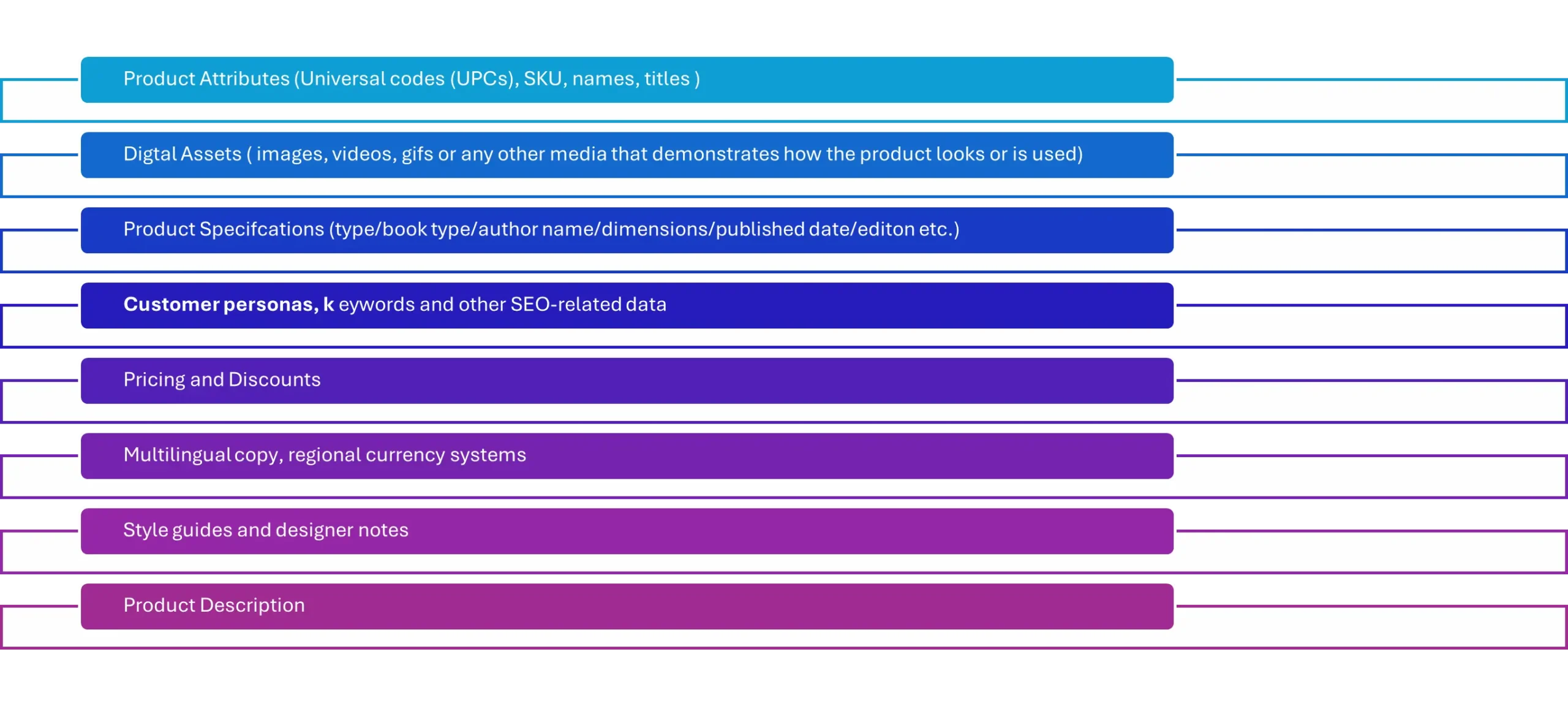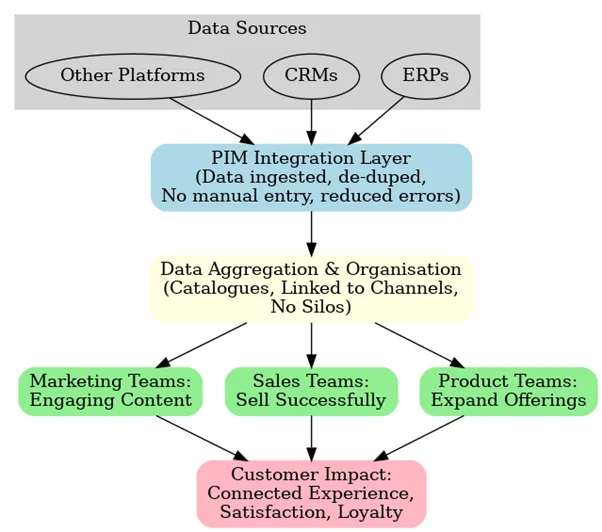“Isn’t Product Information Management (PIM) systems relevant only to ecommerce brands and enterprises??”
We hear this quite a lot in our ecommerce consulting workshops with our customers and prospects.
Do you also believe that? Well, my dear friend, today we’re here to bust this myth!
The truth is – a Product Information Management (PIM) system is a versatile tool that can be invaluable whether or not you have an ecommerce store.
Busting the Myth: Is Product Information Management (PIM) System Only for Ecommerce?
Do you own a thriving brick-and-mortar retail chain with thousands of products, multiple vendors, and ever-changing catalogs?
Or perhaps you manage a manufacturing business, supplying products across different geographies with varying compliance standards?
Your sales reps struggle with outdated product sheets, your customers get inconsistent information across stores, and your marketing team is drowning in spreadsheets. Sounds chaotic, right?
As we evolve into and dwell in a hyper-connected world, data is pouring in from all directions—and in all formats!
We understand, you are dealing with an overwhelming amount of data – structured and unstructured, actionable and raw, some of which in industrial standard can be categorised as:
- Product data from suppliers and manufacturers.
- Customer data from CRM systems and loyalty programs.
- Digital assets like images, videos, and 3D renderings.
- Marketing and campaign data from social media and ad platforms.
- Inventory data across warehouses and offline stores.
- User-generated content such as reviews, testimonials, and feedback.
Managing, organizing, and distributing such a large number of data types across multiple channels can be overwhelming, even if your business operates entirely offline.
Now, here’s a staggering fact—As per MIT Sloan Management Review, companies lose an average of 15-25% of revenue due to poor data quality and mismanagement.
According to Dr. Thomas C. Redman, President of Data Quality Solutions, 60% of employees spend excessive time searching for and correcting data, leading to inefficiencies and errors.
This is exactly where a product information management (PIM) system can be a saviour. A PIM solution is super-effective as it acts as a single source of truth (SSOT) to streamline your operations.

Whether you are a manufacturer, wholesaler, distributor, or retailer with no online presence, a centralized data hub can transform the way you manage, track, and distribute product information.
Before going deeper into who and why you actyually need a PIM solution, let’s look at how a PIM solution works.
How Does a Product Information Management Solution work?
Let us understand how a PIM system works with an example of an ideal fashion retailer who has to manage 10000s of SKUs across offline and online stores, marketplaces, and in-store kiosks.
Without a single/centralised source of truth, product details often become duplicated, inconsistent, or outdated across channels :
- Size charts might sit in excel sheets maintained by regional teams,
- material descriptions may exist in separate PDFs from suppliers,
- pricing lists might stored in outdated CSVs in the ERP.
- Marketing teams may even maintain their own Word files for campaign copy.
When data from these multiple, disconnected channels is pushed directly into customer-facing platforms, havoc is inevitable.
Now when we refer to data that a Product Information Management system works with, it can include:

Customers browsing the website may see a “cotton shirt” listed as 100% organic cotton, while the same item on a marketplace like Amazon shows it as a “poly-cotton blend.”
In-store teams might have yet another version of the size chart, leading to mismatched labels.
Even something as simple as updating a new color variant or adjusting a seasonal discount can take weeks, because it requires manual updates across multiple disconnected spreadsheets and systems.
This not only confuses customers but also slows down marketing and sales teams.
Pimcore solves this challenge by acting as the central hub for product information.
It ingests data from ERPs, CRMs, and other business systems.
It also automatically cleans, de-duplicated, and harmonizes all the data in real time.
Once the data is organized into rich digital catalogs, it is ready to be instantly distributed across multiple channels; whether that’s a web shop, mobile app, or global marketplace like Amazon.

For businesses, this means:
- marketing teams can craft compelling, consistent and contextual product narratives and campaigns,
- sales teams can access the latest specs without delay, and
- product managers can expand offerings in line with consumer trends.
For customers, it translates into accurate, engaging, and consistent product experiences that inspire motivation to buy, trust the brand, and show long-term loyalty.
Do I Need a Product Information Management Solution Even Without a Digital Presence?
Let us also tell you that whether or not you have a digital footprint, if your organization deals with a large volume of data that needs to be managed, tracked, and distributed efficiently, a PIM solution can be a game-changer.
However, any company dealing with a vast array of product specifications, multiple distribution channels, and frequent product updates can benefit from a centralized and unified data hub. This includes:

- Manufacturers & Distributors: Managing complex product catalogs, technical specifications, and supply chain logistics.
- Wholesalers: Ensuring consistent and up-to-date product data across multiple vendors and partners.
- Retailers (Without an Online Store): Standardizing product descriptions, pricing, and attributes for in-store catalogs and sales teams.
- Automotive & Industrial Sectors: Handling intricate component details, compatibility data, and supplier information.
- Healthcare & Pharmaceuticals: Maintaining accurate product documentation, regulatory compliance, and distribution records.
The Power of a Centralized Data Hub
A comprehensive product information management (PIM) solution such as Pimcore doesn’t just store information—it acts as a single source of truth for your entire organization.
Have you ever found yourself managing two versions of the same product catalog floating around? A PIM ensures there’s only one source of truth for all information.
Instead of managing scattered spreadsheets, legacy systems, or disconnected databases, a Product Information Management (PIM) software ensures consistency, accuracy, and efficiency. This brings:
So maybe he is someone who supports sustainability and all may have a conflict of interest with our solutions?
- Centralized Data Management: Having a single repository for all product, customer, and operational data ensures consistency and accuracy.
- Location-Specific Pricing & Inventory Management: Product Information Management (PIM) solutions can automate inventory tracking, price mapping, and stock updates based on physical store locations.
- Multi-Channel Distribution: Even if you don’t sell online, PIM ensures your product information is structured and readily available for various offline channels, distributors, and marketing campaigns.
- Enhanced Decision Making: A unified Product Information Management (PIM) system provides valuable insights into customer preferences, sales performance, and product lifecycle trends.
Want to know about what’s selling well in your flagship store but is not selling well online or on any other channel?
A product information management (PIM) software can help you track product performance and customer trends, reducing overstock by up to 30% and optimizing inventory allocation.
- Faster Time-to-Market – Reduce delays caused by fragmented data sources and improve operational speed.
- Enhanced Collaboration – Sales, marketing, inventory, and supply chain teams can access the same accurate information.
- Better Data Quality – Eliminate errors, duplicates, and inconsistencies in product listings and descriptions.
- Seamless Distribution – Whether it’s internal teams, third-party vendors, or print catalogs, data can be easily shared across channels.
Common Signs You Need a Product Information Management Solution:
| · You’re managing hundreds (or thousands) of SKUs.
· You rely on spreadsheets that are often outdated or duplicated. · Marketing spends too much time finding images and descriptions. · Your sales teams complain about incorrect specs or pricing. · You struggle with regulatory compliance and product traceability. · Product data is spread across emails, folders, and legacy systems. |
If you nodded at any of these, it’s time to explore a Product Information Management solution
Case Study: A Leading Home Improvement Retailer’s Omnichannel Transformation
One of our customers, a leading manufacturer and retailer of home building & improvement materials with an established online presence approached us with a unique challenge.
They wanted to enhance omnichannel customer experience by launching offline retail stores while maintaining a seamless connection with their ecommerce platform.
Our solution involved a comprehensive omnichannel commerce system augmented by Pimcore integration. Through this solution, we leveraged Pimcore’s Product Information Management (PIM) and Digital asset management (DAM )capabilities.
This allowed the company to:
- Centrally organise and manage all product, customer, and inventory data across online and offline stores.
- Ensure data consistency across digital catalogues, POS systems, and in-store kiosks.
- Enable real-time updates for stock availability and pricing across all platforms.
- Enhance customer experiences with a unified and personalized shopping journey.
The result? A streamlined, efficient, and customer-centric omnichannel business model that bridged the gap between digital and physical retail.
Another Success Story: Furniture & Fabrics Industry Giant
Our client, an established player in the global furniture and fabrics industry, had multiple retail stores across India, the Middle East, and Europe. They needed a centralized system to manage their product and asset data at scale.
Business Challenges:
- Consistent UI/UX across platforms
- Seamless interoperability across multiple systems
- Role-based access control and workflow optimization
How Pimcore Helped Solve the Challenge:
- Efficient UI Replication: We ensured an identical UI to minimize training efforts.
- Robust PIM & DAM Integrations: Enabled streamlined product data and digital asset management.
- Master Data Management (MDM): Ensured accuracy and consistency across business units.
- Role-Based Access & Custom Workflows: Enhanced security and optimized business processes.
- Third-Party Integrations & REST APIs: Connected Pimcore with external systems for real-time data updates.
The Impact:
- Improved data consistency across multiple stores
- Streamlined inventory and asset management
- Increased operational efficiency through automation
Final Thoughts
A PIM system is not just a tool for digital businesses—it’s a necessity for any organization that deals with vast amounts of data.
Whether you’re managing thousands of SKUs, handling customer preferences, or distributing information across multiple stakeholders, a centralized and unified source of truth can drive efficiency and growth.
So, if you’ve been wondering whether a PIM solution is relevant to your business, the answer is: absolutely YES—regardless of your digital footprint.
With Pimcore’s powerful and flexible PIM and MDM platform, businesses can streamline operations, improve data accuracy, and prepare for an omnichannel future—regardless of their current digital presence.
As a Certified Pimcore SI Partner, Embitel has helped several key brands with successful integration of Product Information Management with their existing systems, paving way for better CX and enhanced efficiency!
Get in touch with us for a quick demo!




